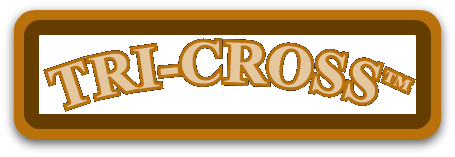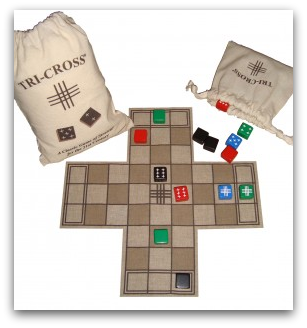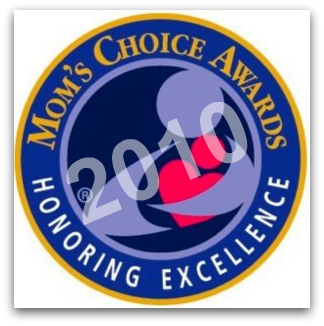There is a new game on the market that is a cross between Checkers, Chess, and Stratego.
I started my adventure with the Tri-Cross Eco-Friendly board game when our family was away in the mountains for a church retreat. It was the first time I had even looked at the directions, and my noble college-aged daughter agreed to try to play it with me.
We opened it up, set it up, and tried to figure out what we were supposed to do from the printed instructions.
We failed. We put it away to try again later.
I was remembering, in the back of my brain, that I had received a CD/DVD in the package with the game. I decided I needed to find that, when I got home, and see what new insight I could glean from it.
It was a DVD, and it was very helpful. [Turns out, the same videos are also available on the Games for Competitors website. After watching it, I still had some questions in my head, but I understood the game a bit more and wanted to try it with someone.
Basically there are three different ways you can play the game:
- Start with all the pieces face-up, showing each piece's value and strength. (See picture above.)
- start with all the pieces face-down, and remember where you put your pieces, but your opponent doesn't know which piece is which until two opponents' pieces get positioned where they must each be revealed, and the stronger piece then jumps. (To play this way you draw a color out of the bag to determine who goes first, then you take turns placing your six pieces on any available space in any starting zone.)
- start the game where the opponent puts your pieces on the board face down and you put your opponent's pieces on the board face down, and again pieces have to be revealed when they are positioned a certain way. (To play this way, after you determine who goes first, each person takes turns placing the other player's pieces face-down on available spaces in any of the four start-zones.)
So, I sought out my son to play the first version (above) of game with me (also known as the easy, face-up version). This time we played the boxed version.
He won the first game, and when we were setting up for the next game he already had the required positions for set-up memorized. (Amazing, these young minds. I still don't have the set-up positions memorized.)
Second game, I won. And by the third game, my son was saying he doesn't like the game. Frankly I don't think he has given the game an adequate chance, and I hope I can get him interested in it again sometime in the future.
My daughter was too busy with her new college semester to play again, so I was looking for another opportunity. Then my really smart brother came over to dinner. I knew this could be good! So I told him about the game, and he was willing to give it a try.
My brother has an amazing brain! It's one of those steel trap minds. He read through the instructions, and we began playing using the face-up method. I won a few, he won a few, and then he was willing to try the face-down version.
At this point I was at a total disadvantage. You need to understand my mind to get this completely: for me, once my pieces were upside-down, almost immediately their face-value would disappear from my brain. At best, I could remember that, like "one of these two is the six, and of these is the tri-cross", but I couldn't remember which was which, so I lost games to him because of this. He'd challenge what I thought was my six with his six, but it would actually be my tri-cross, and I'd lose it because a six jumps a tri-cross.
Anyway, this game has a lot of depth to it, and I think it is an excellent addition to any home's selection of strategy games. Tri-cross is different from checkers because: 1) when you "can" jump, you "must" jump; 2) jumps are horizontal or vertical, not diagonal; and, 3) when you jump it does not count as your turn. Because of that second rule, my brother and I were hard pressed in our efforts to remember whose turn it was. I'd move a piece, and then he would have to jump me, and then I'd have to jump him, and then he'd have to jump me, and then it was his "turn" to move a piece. It would get very confusing, but that's mostly because it's so different than chess and checkers.
Tri-Cross is not like chess because all pieces move in the same way: horizontally or vertically, one space at a time, and again, jumping does not count as a move.
Tri-Cross is won in one of two ways: either you jump all of your opponent's pieces and remove them from the board, or you occupy the Tri-Cross square in the center of the board for four consecutive turns.
Tri-Cross can be played by 2-4 players, and can be enjoyed by players aged 8 through adult. I have only played with two players so far. The eco-friendly version comes in a little canvas bag, and has a heavy-duty canvas board that folds up to fit in the bag.
Tri-cross received the Mom's Choice Award in 2010
as well as the Dr. Toy Best Green Product award for 2010.
Tri-cross is a game that was originally invented in the 1980's by a dad, Glenn Burns, who wanted to invent a game to challenge and engage his three sons. This would be a game that would force them to make connections in deep parts of their brains, create strategies, look ahead and see in their minds what outcomes would result from different moves. The game was a success with the Burns' boys, so Dad made 100 more copies of the game and made an effort to develop market interest in the game; but he was not successful, so he let it drop. The game then sat collecting dust for decades. The sons went on to college, grew into adults. And one day they were reminiscing about the game and got the idea to work together with dad to make another effort to market the game. And they have done a great job of creating a very professional-looking game that stands to be a big hit. I wish them all the best with the fabulous product.
The name of the company that makes Tri-Cross is Games for Competitors (GFP). The Standard version of the game (cardboard board and in a box) sells for $24.95. The Eco-Friendly Portable Tri-Cross sells for $19.95. They also sell a Tri-Cross Wood Edition for $34.95. In addition, they sell Tri-Cross T-Shirts for kids and adults for $12. To purchase, go to their website and click on "Buy Now" (to purchase over the internet), or go to Games for Competitors and click on "Store Locations" to find a location in your state.
To contact GFP, write to GFC Georgia LLC (Games For Competitors)
3069 McCall Drive, Suite 1
Atlanta, GA 30340
or reach them by telephone:
Phone: 770-452-7987
Fax: 770-452-8138
or reach them by email: info@gamesforcompetitors.com
I received a free set of the Tri-Cross Eco-Friendly Portable game, as well as a standard version boxed set of Tri-Cross, in exchange for my review of the product. I think this is a great game for developing logical thinking in kids, and it is so versatile that it would be a hit with home school families, co-ops, school classrooms, youth groups, ...you name it. The biggest obstacle is that it takes a bit to learn the game (it's not as easy to learn as Checkers), but the website tutorial really does a great job to help people learn the game. I did find that I tired of the game after a bit, but that may have been because I was at such a disadvantage playing against my brother. I felt like he fried my brain. He played several games, trying to figure out my strategy before he realized I didn't have a strategy.... :P I had much more fun today when, in order to take photographs, I played against myself! :D
I think I like this game, but I think I want to pick my opponents carefully, because playing against my brother made me feel stupid... ;-)
Any questions? You can ask me, but you might understand the game better by watching the tutorials on the company website!
To read more reviews about the Eco-Friendly Version of Tri-Cross, go to the TOS Crew Blog.
A glimpse into our Charlotte Mason homeschool life, with a touch of FlyLady, seasoned with menu plans, and spiced with product reviews.
Pages
- Artist Study
- Bible
- Composer Study
- Crafting
- Folk Songs
- Hymn Study
- Nature Study
- Poetry Study
- Product Reviews
- Menu Mondays
- Tuesday Tidbits
- Wednesday Words
- Think Back Thursday
- Friday Wrap-Ups
- 100 Verses
- Giveaways!
- Blog Cruise
- Geneology
- George Washington's Rules
- Efraimson Family
- Hall Family
- Walker Family
Subscribe to:
Post Comments
(
Atom
)










Very informative review. I think I would like to play this game. I have one daughter that would really like it & one that I think wouldn't like it at all.
ReplyDelete